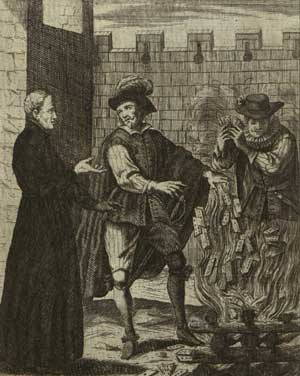|
Famous engraving of playing cards tumbling into a blazing log fire as
Father Rodericus Ninno de Guzman (c. 1571–1626)
reforms the city of Toledo. (www.RemnantNewspaper.com)
Toledo, Spain, a city that has existed since the Bronze
Age (3200-600 B.C.), an important center in the Catholic
Reconquest of the Iberian Peninsula, once the capital of
the Visigothic kingdom of Spain and later the Kingdom of
Castile, a city that played an important part in the
Spanish Civil War of 1936-39, labeled “The Last Crusade”
by Catholic historian Warren Carroll, a city long known
as a bastion of Catholicism, has now seen the departure
of its last Jesuits, whose presence in Spain continues
to diminish not through expulsions but simply by virtue
of old age: the last three Jesuits of Toledo have left
their house and their ministry as of 1 July 2011, a date
which should hereafter live in infamy in a nation that
is giving itself over to a paganism abandoned more than
one thousand five hundred years ago.
Toledo, a city that hosted synods of the Church
beginning in the fourth century, that in 633 decreed
uniformity of liturgy throughout the Visigothic kingdom,
a city in which the Jesuits established their presence
in 1558, a city with an estimated population of some
83,000 souls, is now a city in which the order founded
by a Spaniard is now a city in which the presence of the
Company of Jesus is now a memory rather than a reality.
One asks how long it will be before this is true
throughout the nation.
The Jesuit presence in Spain has declined by more than
half since the “new springtime” of the Church ushered in
not a rebirth but heralded a senescence that now
threatens it with extinction. Those who remain are not
the young, but rather a company of “soldiers for
Christ”—“God’s Marines”—who for the most part might now
be better seen as the sort of veterans wheeled out for
patriotic holidays celebrating service in the Second
World War. The venerable Company of Jesus, rather than
recognize that its experiment with Modernism has yielded
a highly toxic result, seems to have chosen a kind of
collective suicide in Spain and elsewhere, yet there is
no indication that the experiment is to be abandoned;
instead, it is the Society of Jesus itself that is being
abandoned.
It is worth noting that the present Superior General of
the Society of Jesus (Fr. Adolfo Nicolás) is a Spaniard.
He is known to be an outspoken advocate of what has come
to be known as “liberation theology,” a highly
controversial movement criticized by the late John Paul
II and Joseph Cardinal Ratzinger (now Pope Benedict XVI)
while serving as the head of the Vatican's Congregation
for the Doctrine of the Faith, who nevertheless
confirmed Fr. Nicolás as Superior General in 2008, the
same year in which Fr. Nicolás stated that liberation
theology could be described as a “courageous and
creative response to an unbearable situation of
injustice in Latin America,” according to an article in
America: The National Catholic
Weekly.
One wonders if Fr. Nicolás views
the “situation” of the Society in his native land as
“unbearable,” given its current state of affairs. |
